
I remember sitting in Moody Church in downtown Chicago one Sunday morning listening to the amazing Dr. Erwin Lutzer and his sermon on Christian Maturity. He illustrated his point saying, “I know that each and every member of our church is a mature believer. I know this because no one has yet challenged my pronouncing the word as “maTurity and not “maCHurity”. Well, I thought it was funny. Still do. What isn’t funny is when a follower of Christ stops growing in faith.

Ask any leading biblical archeologist and they are likely to say that there is no evidence of the Exodus story the Bible recounts in great detail. What they really mean is that there is no evidence during the time of Ramses II -- or any time during Egypt’s New Kingdom. One man had the audacity to ask if perhaps the evidence existed previous to the accepted timeframe and found not only answers, but some pretty compelling evidence as well. Patterns of Evidence – Exodus, now available on Netflix, is the story that proves The Story.
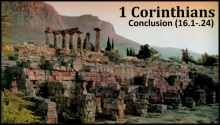
Chapter 16, the final chapter of 1 Corinthians, is divided into two parts each promoting the common theme of obedience to proper authorities. The first part, .1-.13, is a short narrative concerning ministry. The second part, .13-.24, contains subtle warnings against false teachers. In the first four verses we find that obeying proper authorities entails giving. These four verses parallel his expanded teaching of the subject in 2 Corinthians 8.1-9.15. The practice was to save a portion of one’s income to be given as a gift (not a tithe, which in the Old Testament was actually a tax) to traveling missionaries.
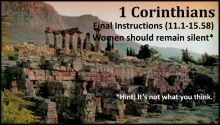
There is one more often misunderstood instruction left to this chapter. Beginning in verse 33 Paul states that “women should remain silent in the churches. They are not allowed to speak, but must be in submission, as the Law says.” Is Paul suddenly revealing a flash of chauvinism? Is he now trying to inject some Old Testament law into Christian living? On the contrary, but to understand this teaching we must understand the circumstances that prompted it. In Paul’s day, women were not formally educated and most of the men were. What difference does this make? Good question.

Yesterday we examined a few of the horrors that took place over the last week. I mentioned that while our outrage is understandable that we shouldn’t be surprised, at least not if we understand what the Bible teaches about humankind. Most worldviews disagree with the Bible’s assessment of our nature. Largely, people—including many Christians—think that mankind is either basically good, or morally neutral. We like to think that we’re “not that bad”; we like to point to the villains of history, like Karadzik or the Taliban, to tip the scales of righteousness in our favor.

I’m not sure where I first came across this, so I’ve no idea who to attribute this to and I apologize if I’m stepping on any copyrights, but I thought this was worth repeating on this special day, as it is an example of just why Jesus came to conquer sin and death. This man’s story reveals some powerful truths; the selfishness and brokenness of man, our need for a savior, and the fact that God always finishes what he starts. Happy Resurrection Sunday!
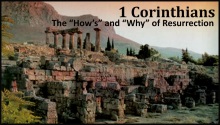
After establishing the reality of a bodily resurrection – an essential point for the day as the Jewish tradition was divided on the issue and Christians were to make it a foundational aspect of their faith -- Paul turns to explain the nature of the resurrection body itself (.35-.57). There are two primary concepts Paul will teach us: how the body is raised from the dead, and perhaps more interestingly, why.
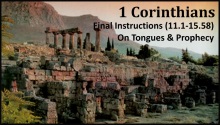
We have seen in the last couple chapters the importance of both unity and diversity in the church, including what tensions these two bring, and how these tensions may be resolved. Further, we have explored and defined spiritual gifts, and the greatest gift of all to mankind -- the gift of love. In stride with these teachings, and the issue of orderly worship which began in chapter 11, Paul continues to teach in chapter 14 regarding our dependence on love and order. The chief concerns are orderly conduct in worship by recognizing the value and proper use of tongues and prophecy.

“Pope Francis Washes Refugees’ Feet in Holy Week Rite”, “Easter Attack in Pakistan Kills Dozens”, “After Islamic State Onslaught, Some Syrian Sites Still Stand”, “Bosnian Serb Convicted of Genocide”. These are just some of the headlines from this last week (thank you Wall Street Journal). What are we to make of all this? How does one think-biblically about the mix of religious traditions, some inspiring hope and humility others unleashing unimaginable horrors and terror? Does the Bible have any relevance in this modern day kingdom of madness?
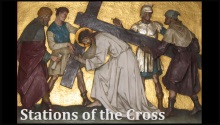
We had been traveling for several days. After landing in Tel Aviv at the Ben Guerin Airport we traveled south, from one side to the other, viewing the Mediterranean on one side and the desert on the other. Roman aqueducts still stretch for miles through the desert and Tiberius is still a city by the Sea of Galilee. It was all fascinating and ancient and caused one to feel they are a part of the history of the Holy Land until, that is, we reached Jerusalem. The nation’s capital is a bustling city and not unlike most other world metropolises…
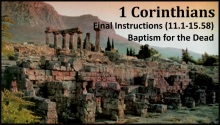
Following these lessons in orderly worship (chapters 11-14) Paul iterates the gospel’s logical reasoning in chapter 15. The first seven verses relate the gospel; eight through 11 Paul’s own history with the gospel; 12 through 28 tell of Christ’s authority; 29 through 57 answers the question regarding bodily resurrection, and verse 28 applies this in the most natural way. How’s that for a 30,000 foot view of the passage?
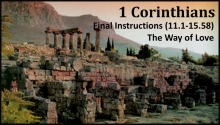
In chapter 13 we discover the basis of the body’s commitment. There is not one single gift Paul mentioned that outweighs the importance of love. On the contrary, love is the basis of the gift. For it is God’s love which gives the gift; it is our love for God that directs the use of the gift; it is our love for others that allows us to use the gifts to serve them. God has demonstrated His love to us repeatedly. By examining the list in verses 4-8a we see a perfect description of God’s love for his children.
